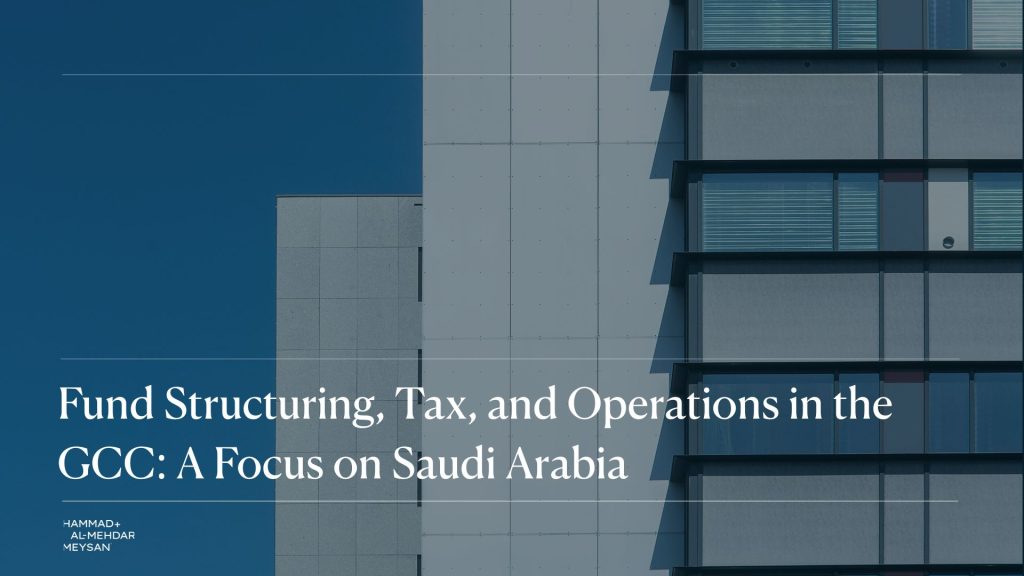
As the Gulf Cooperation Council (GCC) region continues to evolve as a global centre for capital markets, Saudi Arabia stands out for its progressive reforms, robust financial infrastructure, and expanding domestic investor base. The Kingdom’s Vision 2030 strategy has significantly accelerated regulatory transformation, enabling a more sophisticated environment for fund structuring, tax optimisation, and operational efficiency.
Evolving Investment Landscape in Saudi Arabia
Saudi Arabia’s economic diversification agenda has fuelled demand for private capital, institutional asset management, and foreign participation. The Capital Market Authority (CMA), alongside the Saudi Central Bank (SAMA) and the Zakat, Tax and Customs Authority (ZATCA), continues to modernise regulations to support this growth.
The Investment Funds Regulations, issued by the CMA and most recently updated in 2023, provide a clear legal foundation for the establishment and operation of various fund types. These include public, private, real estate, venture capital, and Shariah-compliant funds. The regulations offer structuring flexibility while maintaining high standards for investor protection and disclosure.
Fund Structuring in the Kingdom
Fund vehicles in Saudi Arabia can be structured as locally domiciled funds, such as Closed-Ended Investment Funds (CEIFs), or through hybrid models involving offshore funds paired with local feeder or parallel structures. The selection depends on factors such as investor profile, tax treatment, investment strategy, and regulatory exposure.
All locally established funds must be managed by a CMA-licensed fund manager and supported by authorised service providers (custodians, administrators, and auditors). Foreign fund managers can also access the Saudi capital markets through the Qualified Foreign Investor (QFI) framework, which has been expanded and simplified to improve cross-border participation.
Incentives have also emerged from the Economic Cities and Special Zones Authority (ECZA), which offers relaxed licensing procedures, favourable tax treatment, and 100% foreign ownership for funds domiciled within special economic zones, such as the Riyadh Integrated SEZ.
Tax Considerations
Saudi Arabia’s tax regime for investment funds includes several key considerations:
- Zakat and Corporate Tax: Saudi and GCC investors are subject to Zakat, while non-resident investors may be liable for a 20% withholding tax on returns, subject to reductions under bilateral tax treaties.
- VAT: As of 2025, Value Added Tax remains at 15% and applies to management and advisory fees. Fund managers must ensure VAT compliance, particularly for cross-border service provisions.
- Transfer Pricing: ZATCA enforces detailed transfer pricing guidelines, requiring proper documentation and arm’s-length pricing for related-party transactions, including those involving fund sponsors and affiliated managers.
- Economic Substance Rules: Although less prominent than in offshore jurisdictions, Saudi-based fund structures may still need to demonstrate commercial substance, particularly if part of a global tax planning arrangement.
Proper structuring, robust documentation, and tax efficiency analysis are essential for both domestic and cross-border fund arrangements.
Operational Compliance and Excellence
The CMA mandates comprehensive operational standards for all authorised funds. These include:
- Independent governance structures such as fund boards or oversight committees
- Rigorous internal controls and compliance systems
- Transparent NAV calculation, valuation, and investor reporting
The digitalisation of regulatory filings and investor services has become a hallmark of the evolving fund landscape. Leading Saudi-based fund managers now deploy fintech solutions for onboarding, KYC/AML compliance, and performance tracking.
Shariah-compliant funds, in particular, must adhere to Islamic finance principles, requiring oversight from a Shariah Supervisory Board, specialised audit frameworks, and regular certification aligned with SAMA and AAOIFI standards.
Regional Comparison and Strategic Positioning
While the UAE, Bahrain, and Qatar have long been recognised for their robust financial ecosystems, Saudi Arabia offers a distinct advantage: a large, capital-rich domestic market, coupled with government support for long-term investments.
The development of Tadāwul (Saudi Exchange), Edaa (Securities Depository Center), and Muqassa (Clearing House) has significantly enhanced market infrastructure, liquidity, and investor confidence. Moreover, the increasing alignment with IOSCO standards and global fund reporting frameworks positions Saudi Arabia as a credible hub for both regional and international fund activity.
Outlook
Looking ahead, Saudi Arabia is expected to continue liberalising its fund ecosystem. Anticipated reforms include broader eligibility for foreign sponsors, enhancements to ESG fund classification, and deeper integration with GCC regulatory standards. With the convergence of public policy, investor appetite, and institutional readiness, Saudi Arabia presents a compelling jurisdiction for fund structuring, administration, and capital deployment.
For fund sponsors, asset managers, and institutional investors, understanding and navigating the legal, tax, and operational nuances of Saudi Arabia’s fund environment is not just strategic — it is essential for long-term success in the region.
